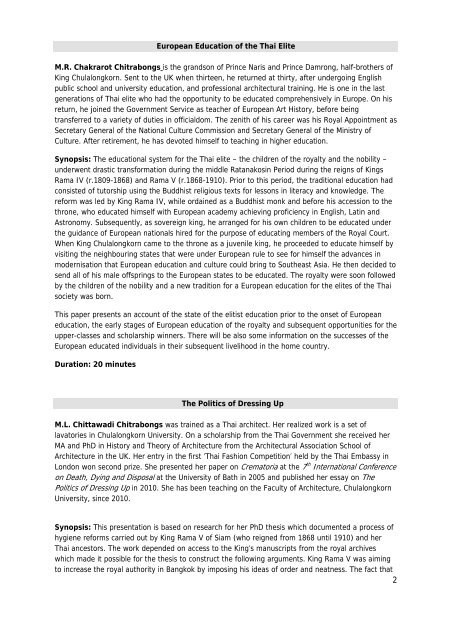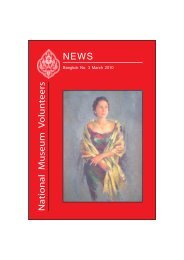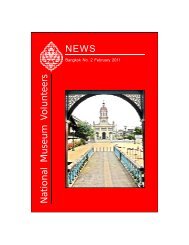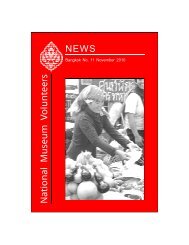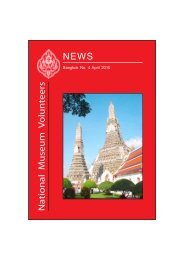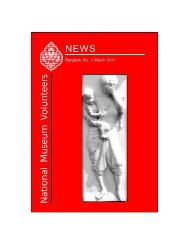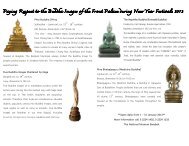details - National Museum Volunteers
details - National Museum Volunteers
details - National Museum Volunteers
Create successful ePaper yourself
Turn your PDF publications into a flip-book with our unique Google optimized e-Paper software.
European Education of the Thai Elite<br />
M.R. Chakrarot Chitrabongs is the grandson of Prince Naris and Prince Damrong, half-brothers of<br />
King Chulalongkorn. Sent to the UK when thirteen, he returned at thirty, after undergoing English<br />
public school and university education, and professional architectural training. He is one in the last<br />
generations of Thai elite who had the opportunity to be educated comprehensively in Europe. On his<br />
return, he joined the Government Service as teacher of European Art History, before being<br />
transferred to a variety of duties in officialdom. The zenith of his career was his Royal Appointment as<br />
Secretary General of the <strong>National</strong> Culture Commission and Secretary General of the Ministry of<br />
Culture. After retirement, he has devoted himself to teaching in higher education.<br />
Synopsis: The educational system for the Thai elite – the children of the royalty and the nobility –<br />
underwent drastic transformation during the middle Ratanakosin Period during the reigns of Kings<br />
Rama IV (r.1809-1868) and Rama V (r.1868-1910). Prior to this period, the traditional education had<br />
consisted of tutorship using the Buddhist religious texts for lessons in literacy and knowledge. The<br />
reform was led by King Rama IV, while ordained as a Buddhist monk and before his accession to the<br />
throne, who educated himself with European academy achieving proficiency in English, Latin and<br />
Astronomy. Subsequently, as sovereign king, he arranged for his own children to be educated under<br />
the guidance of European nationals hired for the purpose of educating members of the Royal Court.<br />
When King Chulalongkorn came to the throne as a juvenile king, he proceeded to educate himself by<br />
visiting the neighbouring states that were under European rule to see for himself the advances in<br />
modernisation that European education and culture could bring to Southeast Asia. He then decided to<br />
send all of his male offsprings to the European states to be educated. The royalty were soon followed<br />
by the children of the nobility and a new tradition for a European education for the elites of the Thai<br />
society was born.<br />
This paper presents an account of the state of the elitist education prior to the onset of European<br />
education, the early stages of European education of the royalty and subsequent opportunities for the<br />
upper-classes and scholarship winners. There will be also some information on the successes of the<br />
European educated individuals in their subsequent livelihood in the home country.<br />
Duration: 20 minutes<br />
The Politics of Dressing Up<br />
M.L. Chittawadi Chitrabongs was trained as a Thai architect. Her realized work is a set of<br />
lavatories in Chulalongkorn University. On a scholarship from the Thai Government she received her<br />
MA and PhD in History and Theory of Architecture from the Architectural Association School of<br />
Architecture in the UK. Her entry in the first ‘Thai Fashion Competition’ held by the Thai Embassy in<br />
London won second prize. She presented her paper on Crematoria at the 7 th International Conference<br />
on Death, Dying and Disposal at the University of Bath in 2005 and published her essay on The<br />
Politics of Dressing Up in 2010. She has been teaching on the Faculty of Architecture, Chulalongkorn<br />
University, since 2010.<br />
Synopsis: This presentation is based on research for her PhD thesis which documented a process of<br />
hygiene reforms carried out by King Rama V of Siam (who reigned from 1868 until 1910) and her<br />
Thai ancestors. The work depended on access to the King’s manuscripts from the royal archives<br />
which made it possible for the thesis to construct the following arguments. King Rama V was aiming<br />
to increase the royal authority in Bangkok by imposing his ideas of order and neatness. The fact that<br />
2


